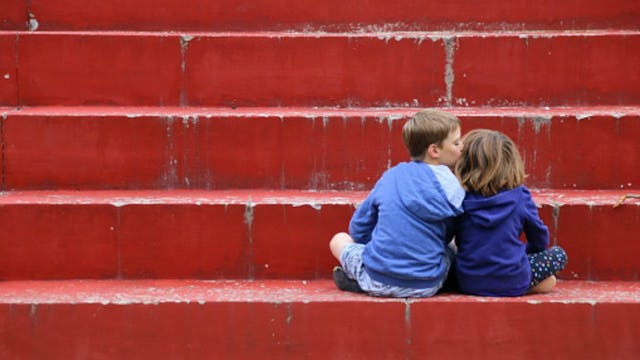Stop Asking Young Kids If Their Friends Are Their 'Boyfriend/Girlfriend'

Adults are constantly saying things to and about kids that make things unnecessarily weird and potentially damaging. But what makes it awkward is that people sometimes don’t see the harm in saying these things, so when I point it out to people—family and strangers alike—I look like the asshole. Sorry not sorry cashier, but I don’t want you telling my son that women would kill for his eyelashes. And no, stranger at the rest area, my “beautiful daughter” is not a heartbreaker and I won’t keep her locked up. And I don’t know, Grandpa, if my 8-year-old daughter and her 8-year-old friend who happens to be a boy will get married someday. They’re 8. They are too young to be thinking about marriage. They are too young to even be thinking about dating a boyfriend or girlfriend.
But people do this all the time. They gender a feature on a child—long eyelashes are no more a female feature than short hair is a male feature. They place blame on a child for another person’s potential to have hurt emotions—specifically a female for hurting a male ego. If someone is heartbroken by unrequited love, it is not the object of one’s affection who is responsible for changing anything they do; nor should they hide themselves in preventative safety from someone who “loves” them. And when people see kids of different genders playing together, they are blinded by the heteronormative and inappropriate notion that boy-girl friends are more than just that—friends.
Stop asking young kids if their friends are their boyfriend or girlfriend. First of all, when you do this, you are assuming that there are only two genders of either male or female and you are basing that on how a kid presents themselves in clothing, hairstyle, and physical features. A child may be nonbinary or gender fluid and not identity as solely male or female. Also, a kid’s assigned gender may not be their true gender, so to just make assumptions makes you look silly.
Assuming different gender friends are more than friends also makes the leap that straight relationships are the norm and are expected. If you are going to be gross and put a romantic label on a child, then why don’t you do it when you see what you assume to be two girls or two boys playing together? It’s because the world is biased and instead of teaching our kids that they can love whomever they want and be whoever they need to be, we are reinforcing the harmful idea that heterosexual love is the “right” love. We are not showing and telling our kids that sexuality, like gender, is a spectrum. We are not showing our kids that there is no such thing as normal when it comes to love, marriage, and family.
When I was in elementary school, I knew I was different. I knew I was gay. But I also knew that was not an okay thing to be. So I just kept my knowledge and whatever elementary schoolgirl crushes I had to myself. But certain situations made me feel the flames of the fiery hell I was taught about were reserved for queers like me.
Valentine’s Day was a nightmare because there was an expectation that if I were to have a Valentine, they would have to be a he. First dances, first kisses, first dates; I didn’t experience any of these in a way that felt right or could be talked about. I knew from a very early age that if I was going to get butterflies around someone, it was supposed to be a male opposite my then-female identity who was causing them. I knew this because it was not uncommon for relatives of mine to ask me if I had a boyfriend.
They also asked me if my male friends, the ones I was playing hide and seek or home run derby with, were my boyfriends. No. Gross. The boys I played with when I was a kid were like brothers. They were my equals and annoying buds who I loved but not love-loved. But the second someone made assumptions or jokes that my relationships with these guys were anything more than grateful friendship, it changed.
It does for your kids too. Little kids are usually grossed out by love or affection not given by their parents or family members, and the idea that the relationships they have are somehow more than friendships is embarrassing. Kids are teased or shamed for having different gender friendships, and it’s bullshit. So stop alienating kids by labeling innocence with adult concepts that perpetuate heterosexual relationships as the baseline for normal.
I am so thankful my kids have a wide network of friends. Two of my three kids are outgoing and make connections pretty easily. My third kiddo struggles a bit to form these bonds; social settings with a lot of people can be overwhelming, and one-on-one friendship time is better for her. As a parent, my job is to help my kids navigate relationships in healthy ways; I approach the subject in terms of a nondiscrimination policy. They know they shouldn’t eliminate a potential friendship based on gender, race, religion, or socioeconomic background. And they know YOU shouldn’t view their relationships in ways that are romantic or territorial.
Kids need friends who they can rely on—no matter their gender. They don’t need adults who think they are clever making stupid jokes about prom or marriage.
This article was originally published on